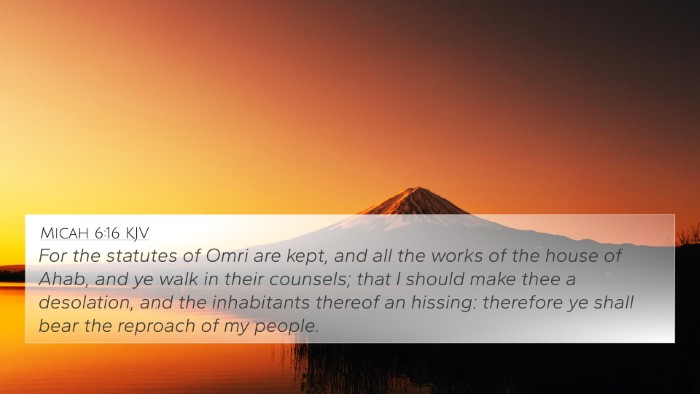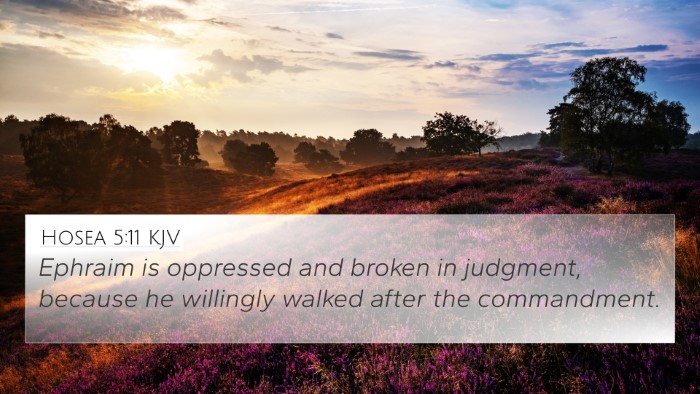Understanding Job 34:30
Job 34:30 states: "That the hypocrite reign not, lest the people be ensnared." This verse falls within a larger discourse where Elihu, the young man speaking, aims to clarify God's justice in suffering and the dangers of hypocrisy.
Meaning and Interpretation
This verse reflects Elihu's assurance of God's sovereignty and His control over rulers and wickedness. Elihu emphasizes that God does not allow hypocritical leaders to remain in power because they lead the people into sin.
Commentary Insights
-
Matthew Henry:
Henry posits that God, in His providence, ensures that hypocritical leaders are removed to protect the populace. He emphasizes the importance of genuine leadership rooted in righteousness, indicating that the fate of the people is contingent on their leaders' integrity.
-
Albert Barnes:
Barnes views the verse as a warning against the allure of hypocrisy in leadership. If hypocrites remain in power, they can ensnare individuals and lead them astray, highlighting God's intervention in human affairs to maintain His moral order.
-
Adam Clarke:
Clarke elaborates on the dangers of hypocrisy, suggesting that where hypocrites reign, society suffers moral decay. He underscores God's authority in establishing true justice, ensuring that the righteous are ultimately rewarded while the hypocritical face consequences.
Cross-References
Job 34:30 echoes themes found throughout Scripture, revealing connections between various verses. Below are key cross-references that relate to the core message of this verse:
- Psalms 12:8: "The wicked walk on every side, when the vilest men are exalted." This illustrates the societal impacts of corrupt leadership.
- Psalms 75:7: "But God is the judge: he putteth down one, and setteth up another." This emphasizes God’s authority over rulers.
- Proverbs 28:12: "When righteous men do rejoice, there is great glory: but when the wicked rise, a man is hidden." This reveals the correlation between leadership and societal happiness.
- Isaiah 3:12: "As for my people, children are their oppressors, and women rule over them." This verse illustrates the consequences of failure in leadership roles.
- Jeremiah 23:1: "Woe be unto the pastors that destroy and scatter the sheep of my pasture!" This depicts God's disdain for hypocritical leaders.
- Ezekiel 34:10: "Thus saith the Lord God; Behold, I am against the shepherds; and I will require my flock at their hand." God's judgment on false leaders, ensuring accountability.
- Matthew 23:28: "Even so ye also outwardly appear righteous unto men, but within ye are full of hypocrisy and iniquity." Jesus denounces hypocrites, reflecting a similar theme to that in Job.
- Romans 2:21: "Thou therefore which teachest another, teachest thou not thyself?" This verse addresses the moral obligation of leaders to reflect their teachings.
- Revelation 19:15: "And out of his mouth goeth a sharp sword, that with it he should smite the nations." God's ultimate authority over earthly rulers is affirmed.
- 1 Timothy 5:24: "Some men's sins are open beforehand, going before to judgment; and some men they follow after." A reminder that judgment awaits hypocrites.
Thematic Connections
This verse establishes a critical theme in Scripture: the importance of integrity and righteousness in leadership. Understanding this verse within the broader biblical context invites deeper reflection on how God oversees governance and justice.
Bible Study and Cross-Referencing Techniques
For those seeking to analyze the connections between Bible verses, utilize the following tools:
- Bible Concordance: Useful for locating specific terms and examining related scriptures.
- Bible Cross-Reference Guide: Helps identify thematic links across different biblical texts.
- Cross-Reference Bible Study: A study method that encourages examining parallel scriptures for comprehensive understanding.
- Bible Reference Resources: Various materials are available to assist in cross-referencing biblical themes.
Conclusion
The essence of Job 34:30 highlights God's justice in leadership, warning of the detriments posed by hypocrisy. By cross-referencing this verse with others, one can better grasp the thematic continuity regarding divine oversight, integrity in governance, and the ethical framework expected of leaders.
For those exploring the Bible, understanding these connections can enrich one's study and provide a fuller picture of how individual verses are interwoven in the tapestry of Scripture.














